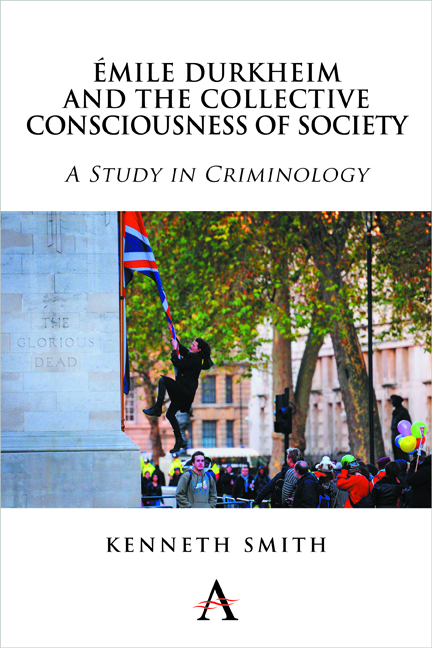Book contents
- Frontmatter
- Dedication
- Contents
- Epigraph
- Preface
- Introduction
- Part I The Concept of the Collective Consciousness of Society
- Part II The Form of the Collective Consciousness
- Part III Durkheim on Crime and Punishment
- Preface to Part III
- Introduction to Part III
- 8 Durkheim on Crime and Punishment in The Division of Labour in Society
- 9 Durkheim on Crime and Punishment in The Rules of Sociological Method
- 10 Interregnum on Suicide (1897)
- 11 Durkheim's Undeservedly Famous ‘Two Laws of Penal Evolution’ Essay (1901)
- 12 Durkheim on Crime and Punishment in Moral Education (1902-03)
- Conclusion to Part III
- Part IV Social Fact or Social Phenomenon? Durkheim's Concept of the Collective Consciousness as a ‘Social Fact’
- Part V Some Problems with Durkheim's Concept of the Common and Collective Consciousness
- Conclusion
- Appendix: On Paying a Debt to Society
- Notes
- References
- Index
Preface to Part III
from Part III - Durkheim on Crime and Punishment
Published online by Cambridge University Press: 05 October 2014
- Frontmatter
- Dedication
- Contents
- Epigraph
- Preface
- Introduction
- Part I The Concept of the Collective Consciousness of Society
- Part II The Form of the Collective Consciousness
- Part III Durkheim on Crime and Punishment
- Preface to Part III
- Introduction to Part III
- 8 Durkheim on Crime and Punishment in The Division of Labour in Society
- 9 Durkheim on Crime and Punishment in The Rules of Sociological Method
- 10 Interregnum on Suicide (1897)
- 11 Durkheim's Undeservedly Famous ‘Two Laws of Penal Evolution’ Essay (1901)
- 12 Durkheim on Crime and Punishment in Moral Education (1902-03)
- Conclusion to Part III
- Part IV Social Fact or Social Phenomenon? Durkheim's Concept of the Collective Consciousness as a ‘Social Fact’
- Part V Some Problems with Durkheim's Concept of the Common and Collective Consciousness
- Conclusion
- Appendix: On Paying a Debt to Society
- Notes
- References
- Index
Summary
In Part III of this study, I want to put to one side for the moment our detailed discussion of the concepts of the common or collective consciousness of society, and look instead in more detail than we have so far at exactly what Durkheim has to say on the subject of crime and punishment generally. And here I will make a really hard and fast distinction – much more so than Durkheim himself was willing to do – between what Durkheim has to say on the subject of crime, which I will consider first in Chapters 8 and 9, before only then, in Chapters 11 and 12, going on to look at what he has to say on the subject of punishment. I will also include, in Chapter 10, a very brief discussion on what he has to say on both these concepts in his book on Suicide.
Having inherited this view from G.W.F. Hegel (Johnson 2001, 147), Durkheim was quite extraordinarily reluctant to distinguish the concept of crime from the concept of punishment – for him these are usually different parts of the same social phenomenon and hence more or less inseparable: ‘two terms of an inseparable pair’ as in fact he describes them in Suicide (1993, 362–3) – but I will argue that Durkheim's confusion on this point leads to any number of problems with what he has to say about these two really very different things, but especially as we will see on the all-important question of whether crime is pathological for society or has a morphological function.
Since Durkheim will not clearly separate these two concepts for himself, we must do this for him.
- Type
- Chapter
- Information
- Publisher: Anthem PressPrint publication year: 2014



